PERSON OF HONOR
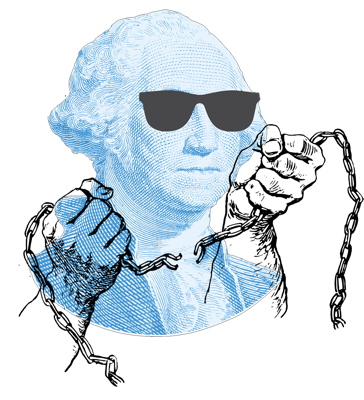
Recently, the National Park Service was embarrassed by what Journalists call a slow newsday in Philadelphia.
That is, there were no explosions, fires, mass murders, or adulterous politicians on tap that day.
Nor had Taylor Swift, Paris Hilton, or Donald Trump elected to visit Philly that day.
Indeed, the City of Brotherly Love was beginning to resemble the famous quote from W.C. Fields: "I went to Philadelphia once, but it was closed."
The reporters needed some copy.
The Independence National Historic Site, managed by the National Park Service, usually has something happening, as Philadelphia was one of the first capitals of the new United States and, in addition to Independence Hall, was the site of the First President's home.
So, the inquiring reporters inquired.
The NPS press person enthusiastically expounded on an archeological dig at the site of President Washington's house "That was yielding exciting new data on the architecture of first president's home " (One can imagine the yawning reporters pining for a decent police shoot-out.)
In passing, the park spokesperson allowed as how the archeologists were also learning a great deal about the day to day lives of the slaves that the President kept in quarters under the house.
"George Washington had slaves in his cellar in Philadelphia?" gasped the reporters.
It wasn't Bill Clinton and Monica Lewinsky, but it would have to do. The reporters were off and running. (Like I say, it was a slow newsday.)
The NPS, one of the more nervous, eager to please agencies in the federal government, was a tad slow in getting the proper spin.
There was a rumor that the Park Service was attempting a cover up, both literally and figuratively, of the story of George Washington's enslaved people in the cellar. True, the NPS had not arranged a shovel by shovel telecast of the archeological dig, and, as standard operating procedure in archeological digs, had planned to back fill; that is cover up the site once the artifacts had been removed. This was regarded by some as an attempt at hushing up the story.
Now neighbors, every reporter yearns to be an "investigative journalist; a fearless seeker after truth who will rip the mask of hypocrisy from the smug members of the power elite, cowardly bureaucrats, and other vested interests who seek to withhold vital incriminating information from the uniformed public.
Naturally, this path to the Pulitzer Prize required a villain or two; in this case, it was the hapless National Park Service and President George Washington.
There actually had been no cover up, at least in the Trump approach to the truth, but publicity seekers were soon on the scene. Philadelphia has a sizable Black population, not all of whom regard their White brethren as guileless seekers after Truth and Justice.
A Black history group rather ominously named "Avenging the Ancestors", promised to look into the matter of Washington's enslaved people and hold NPS feet to the fire.
Things could get ugly.
Now most Americans realize that George Washington had enslaved people working on his Mount Vernon plantation in Virginia. That was perfectly legal and simply the custom of the time. True, a bit hypocritical for a "Champion of Liberty and Freedom", as British sore losers often snidely pointed out, but still legal.
Although neither historians nor the NPS tried to cover it up, most Americans were unaware that President Washington had brought enslaved people to serve in the presidential mansion during the time Philadelphia was the nation's capital.
Again, this was legal, but with restrictions.
Although Pennsylvania was a free state, a "transient slave holder" could bring his enslaved persons into the state. However, if they remained more than six months in Pennsylvania, they became free.
Now George Washington was not sure if this law applied to the President of the United States. Unlike a future President of the United States who was cocksure that no laws applied to him, Washington felt there might be limits to executive privilege.
Therefore, to be on the safe side, Washington got around this potentially expensive problem by rotating his personal enslaved people back to Mount Vernon every six months and replacing them with a fresh crew.

For some odd psychological reason, the idea of Washington having enslaved people in the presidential mansion was very unsettling to modern day sensibilities. To some, this was proof positive that the father of our country was the father of all racists.
Actually, Washington was not a racist. Unlike his associate, Thomas Jefferson, who indeed had a rather nasty racist streak, Washington's writings reveal no animosity or contempt for the Black race. Washington was simply an equal opportunity slave master. It really did not matter to him whether you were English, German or Black: Washington did not like to pay wages and would gladly enslave you. (Something some modern CEO's would understand perfectly as they move American jobs to countries that have lethal views on labor unions and environmental regs.)
One of Washington's indentured servants (that is, White slave) was an English tailor by the name of Andrew Judge who had been indentured to Washington for four years in the return for ship passage from London and the promise of food and shelter. Southern plantations made an effort at self-sufficiency and a tailor would be very useful at Mount Vernon.
While Mr. Judge's tailoring duties kept him busy, there was apparently enough slack time available for him to impregnate one of the Black enslaved girls. We say "apparently" as Mr. Judge hotly denied parentage. Washington disagreed and named the resulting baby girl Oney Judge.
Mr. Judge completed his indenture shortly after Oney's birth and disappears from our story.
Oney, fair and freckled, grew up as a privileged house slave, playmate to Washington's step children. She had, it seems, inherited her father's small hand skills and was, Washington himself proclaimed, "A veritable mistress of the needle" a very important skill in 18th century America.
She became a teenager and shared in the girlish secrets, laughter, and delights of Washington's stepdaughter, Nellie, one of the wealthiest young women in North America. The two young women seemed inseparable. Martha Washington noted this and made plans.
Legally, Oney was Martha Washington's enslaved person, as Oney's mother had been one of Martha Washington's dower slaves. Martha could do what she wished with Oney, even grant her freedom.
However, a glittering new world was to open for Oney. It was time to do the six month slave rotation to Philadelphia as Washington was now president. She and eight other enslaved persons accompanied the Washingtons to the executive mansion at what is now Sixth and Market Streets in Philadelphia.
The contrast could not have been more spectacular. Instead of the isolated, self-contained agricultural world of Mount Vernon, Oney suddenly founds herself in a bustling urban world of brick buildings stretching as far as the eye could see and containing more strangers than Oney had ever seen in her life. The streets were full of new things -- and new ideas.
One idea that impressed Oney was the idea of freedom. Oney did not pick up the idea of freedom from the Washingtons, but rather from the free Blacks that roamed the streets of Philadelphia making their living as laborers or artisans. If you wanted anything moved, loaded, or built, it was almost impossible to avoid coming into contact with the free Blacks of Philadelphia.
Not that Oney sought to avoid them. There were murmured conversations as Black artisans visited the executive mansion in the course of business. It was not as if one of them handed Oney a copy of Tom Paine's "The Rights of Man" (Oney was illiterate). It was something in the way they comported themselves. There was an air about them. They had something that Oney lacked and that was freedom.
The last straw occurred one day when Martha Washington called Oney aside and told her that she was to be given as a belated wedding present to a dear friend of Mrs. Washington. It would be such a surprise!
It was a bit of a surprise for Oney also. She understood that she was an enslaved woman, but the idea of being someone's wedding present drove home the full horror of chattel slavery.
In addition, the lady in question, had, according to Oney, a reputation for being a "mean spirited" woman, who took delight in not only having the benefits of having an enslaved person at her beck and call, but also the sadistic pleasure of rubbing it in.
Oney felt she had to get away.
But where?
A slave's education did not include a course in Geopolitics, but Oney could tap into something even better; an up-to-the minute intelligence network provided by the free Black community of Philadelphia, complete with guides and safe houses.
According to Oney, "I had friends among the colored people of Philadelphia and had my things carried there beforehand and left while the Washingtons were having dinner."
It was a simple as that. However, while Philadelphia was big, it was not that big. Oney would have to continue her escape.
The sea was her best bet. Although the penalty for aiding an escaped slave was death, there were sea captains willing to look the other way. One of these was Captain John Bowles, Master of the coastal trading sloop "Nancy". Captain Bowles would be sailing to Portsmouth, New Hampshire with a cargo of farm equipment -- and Oney Judge.
A ship bound for Europe or Britain might have been a better choice, but fugitives can't be choosers. President Washington was now making inquiries and time was of the essence.
The voyage to Portsmouth was uneventful. (Although Oney may have met her future husband, the free Black seaman, John Staines, aboard the "Nancy".) Oney went ashore and followed memorized instructions to a safe house in Portsmouth.
Slavery had not yet been abolished in New Hampshire, but enslaved people and free Blacks interacted freely in the easy going town of Portsmouth. Oney found work as a seamstress and was quickly absorbed into the vibrant Black community, which was well organized, politically astute and surprisingly well educated.
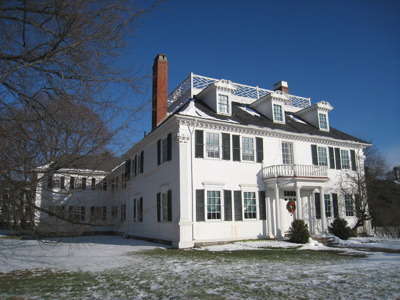 Indeed, in 1779, three years after the signing of the Declaration of Independence, 20 Portsmouth enslaved people signed a remarkable document asking for their freedom.
Indeed, in 1779, three years after the signing of the Declaration of Independence, 20 Portsmouth enslaved people signed a remarkable document asking for their freedom.
The document, "The petition to the New Hampshire Government" compares favorably with the Declaration of Independence (and is considerably less hypocritical).
Some of the more memorable lines from the 1779 petition are worth citing.
That Freedom is an inherent right of the human species, not to be surrendered, but by consent for the sake of social life.That private or public tyranny and slavery are alike detestable to mind's conscious of the equal dignity of human nature.
That all men being amenable to the Deity, for the improvement of the Blessings of his Providence, they hold themselves to be duty bound strenuously to exert every faculty of their minds to obtain that blessing of Freedom which they are justly to by the donation of the Creator.
The Petition was well written, closely reasoned and obviously heart felt. Naturally it was rejected by the New Hampshire legislature.
Oney was plunged into this heady mixture of freedom seekers and freedom achievers. It was a hard life in a harsh New England climate, but she loved it.
Now what did Oney want? Well, she wanted to learn to read and write, she wanted to marry the person of her choice, and interestingly enough, she wanted to paint. Not houses and barns, but portraits and landscapes; that sort of thing. She may have seen the great American painter, Gilbert Stewart in action; painting the President's portrait. Oney thought she would like to give it a try. Rather uppity for a slave girl, but that's what she wanted.
However, shortly after arrival in Portsmouth, Oney's luck ran out.
She was a victim of demographics. Although there were more than three million people in America, only a few thousand actually ran the country, and they all knew each other.
One day Oney was walking along Strawberry Banke in Portsmouth when she was spotted by Miss Elizabeth Langdon, daughter of Senator John Langdon of New Hampshire. Miss Langdon had been a guest at Mount Vernon and had met the talented Oney Judge while staying with the Washingtons. She innocently wrote a letter to Martha Washinton about the amazing coincidence of seeing Oney on the streets of Portsmouth.
President Washington now knew the location of his escaped slave.
He acted with characteristic dispatch, sending a letter via the Secretary of the Treasury to the nearest federal officer. That would be the Honorable Joseph Whipple, Collector of the Port of Portsmouth, New Hampsnire.
Whipple was a tax collector. One of the relatively few sources of income for the federal government was customs duties charged on foreign imports.
It was an important job and it obviously required honest men if the government were to remain solvent.
Joseph Whipple was an honest man, steadfast and true; a person of honor very much like yourself.
Like yourself? Well, yes. This is where it starts to get interesting, neighbors,
Joseph Whipple was going to provide some lessons on how to evade an immoral order and still keep your job: Valuable career information for a federal employee, neighbors!
The letter from George Washington to Joseph Whipple was interesting. It was a straight forward request from Washington to Whipple in his role as a federal officer to assist Washington in the recovery of his stolen property, one Oney Judge.
Stolen?
Well, um, sort of, maybe.
You see, Washington decided to embellish the request with a little white lie. (He had resisted temptation in the cherry tree incident, but apparently the Oney Judge case proved too much of a temptation.)
 Washington felt he had to explain to Whipple the reason why his slave was in Portsmouth. So Washington concocted the "lecherous Frenchman story."
Washington felt he had to explain to Whipple the reason why his slave was in Portsmouth. So Washington concocted the "lecherous Frenchman story."
Now friends, we plain spoken, straight shootin' Anglo-Saxons have always had an inferiority complex competing with Frenchmen in the field of Romance. The legend had grown up that Frenchmen had an irresistible way with women of any race, age, nationality or marital status. It wasn't fair, but that's the way it was, and everybody believed it.
According to Washington, a lecherous, oleaginous Frenchman had taken advantage of the Washington's hospitality and ingratiated himself into the household and played the perfect cad by seducing the impressionable slave girl, filling her head with ideas of running off with him to Portsmouth, "Probably leaving her with child."
The lecherous Frenchman story was a big mistake.
Joseph Whipple, like you, was a federal law enforcement agent. Sea captains and merchants lied to hm every day in his role as tax collector. Like you, he was pretty good at spotting a tall tale.
Something about the Frenchman story may have sounded, as modern Law Enforcement would "hinky."
You see, it was Whipple's collateral duty job to note if there were any strange Frenchmen in Portsmouth. America's relationship with its former ally, France had gone downhill after the French Revolution of 1789. While there was Liberty, Fraternity, and Equality, there was also the Terror, the guillotine and fanaticism.
French intelligence agents were operating in North America; French privateers would soon be taking American merchant ships. America would fight an undeclared naval war with France,
Congress would enact the Alien and Sedition Act, the 18th century equivalent of The Patriot Act. It was a time in short, not unlike our own.
Whipple, however, however, had not observed the arrival of any Frenchman in Portsmouth.
Strange.
Still, here was a request from the President of the United States, through the Secretary of the Treasury, asking for assistance.
According to the letter from President Washington, "the Collector of the Port of Portsmouth should seize and put her (Oney) on board a vessel bound for this place (Philadelphia) or to Alexandria (Virginia) which I would like better, seems at first view to be the safest and least expensive. But if she is discovered, the Collector, I am persuaded, will pursue such measures as to him shall appear best to affect those ends, and the costs shall be reimbursed and with thanks besides."
Now neighbors, here was a chance for a mid-level bureaucrat to score some points with the President of the United States. (What would YOU do if approached by one of Trump's flunkies (say, Sidney Powell) who asked you to perform a small personal service for the President (Nothing illegal mind you.) that would please the President very, very much?.
I thought so! Whipple jumped at the opportunity to be of service. Writing to the Secretary of the Treasury, a Mr. Wolcott,, Whipple wished "to assure you that I shall with great pleasure execute the President's wishes in the matter."
Joseph Whipple was the very model of an efficient bureaucrat. He not only located where Oney was staying, he was careful enough not to spook her with an arrest attempt. Instead, he booked passage for her on a ship bound for Virginia and then lured Oney to the Customs House on the pretext of offering her employment.
Oney showed up and admitted she was indeed Oney Judge, the escaped "Servant" of George Washington, President of the United States.
It would be a small matter to hustle her on board the ship, get on with his duties and enjoy the gratitude of the First Executive.
However, Joseph Whipple was, like you, a person of honor. Something was not quite right. There was another side of the story. and Whipple decided to hear that of Oney Judge. So he took time to interview her and get the facts.
There is no transcript of the interview, but Oney must have presented a truly moving defense of her actions.
First, as Whipple may have suspected, there was no "Lecherous Frenchman." The idea of escape had been Oney's and Oney's alone.
Moreover, according to Whipple "A thirst for complete freedom" had been her only reason for absconding. Whipple stated this in a letter to Washington.
"A thirst for complete freedom."
This was, after all, what the Whipple family was all about. Joseph's brother William was one of the signatories of the Declaration of Independence He had fought at Saratoga and had suffered with Washington at Valley Forge. (Ironically, one of William's slaves, Prince Whipple, was a signatory of the 1779 petition to the government of New Hampshire, asking for freedom.) Joseph Whipple himself had served as Colonel of the militia during the Revolutionary War.
Therefore, he could not in good conscience send her back into slavery against her will.
So what was Joseph Whipple (and you) to do?
Remember, this was the President of the United States asking a federal officer to do something that was quite legal (If morally queasy).
Being a bureaucrat and not wanting any trouble, and above all, wanting to keep his job, Whipple tried flattery and compromise.
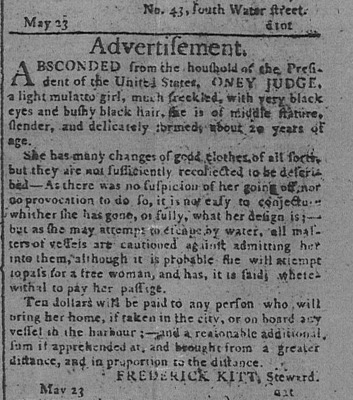 Writing to Washington, Whipple said, "it gave me much satisfaction to find that when uninfluenced by fear, she expressed great affection for her Master and Mistress (That would be George and Martha.) and without hesitation, declared her willingness to return and serve with fidelity during the lives of the President and his Lady, if she could be granted freedom upon their decease, should she outlive them, but she would rather suffer death than return to slavery and be liable to be sold or given to other persons."
Writing to Washington, Whipple said, "it gave me much satisfaction to find that when uninfluenced by fear, she expressed great affection for her Master and Mistress (That would be George and Martha.) and without hesitation, declared her willingness to return and serve with fidelity during the lives of the President and his Lady, if she could be granted freedom upon their decease, should she outlive them, but she would rather suffer death than return to slavery and be liable to be sold or given to other persons."
Oney and Whipple were offering Washington a deal - a compromise
How come? First of all, the Washingtons were not monsters. Oney was not chained to the wall at night, nor was she beaten. Oney had been living the life of an upper middle class woman eating pretty much what the Washingtons ate, living in nice quarters and so on.
She had a surprising amount of freedom. She enjoyed the theatre, and Washington made sure she had enough pocket money to buy tickets whenever she wanted. She also traveled independently by stage coach Ð and was given a per diem to do so. By 18th century standards, life had not been bad for Oney Judge. However, it did lack that vital ingredient; complete freedom.
Whipple suggested to Washington that he was able to convince Oney that her duty lay in returning to her kind Master and Mistress. Indeed, she was ready to step on the ship bound for Virginia and a happy reunion with the Washington when, according to Whipple, the wind changed and the ship was delayed. (Damned bad luck!)
This gave Oney a chance to reconsider and decide that slavery was a bad idea and "complete freedom" a good one.
The ship sailed without her.
Understandably the President was upset. Whipple had the girl in his office and yet she got away! How was this possible?
There weren't any 18th century jokes about "How many federal bureaucrats does it take to tie up a girl and toss her on a ship?" but Washington could certainly wonder. The President may or may not have bought the story about the wind delayed ship, but he was certainly not buying the idea that anyone, particularly the President of the United States, should have to negotiate with a slave girl!
Writing to Whipple, Washington growled, "I regret that the attempt you made to restore the girl, who, without the least provocation, absconded from her mistress, should have been attended with so little success. To enter into such a compromise with HER as she suggested to YOU is totally inadmissible."
Now neighbors, if you saw a future bad performance review for our fellow bureaucrat, Joe Whipple, you wouldn't need a crystal ball.
Except for one thing.
Whipple was an excellent student of human nature and had Washington pretty well figured out.
The President didn't want any bad publicity. He was the most famous and beloved man in America and he wanted to keep it that way. Everything that Washington did was done with grave dignity. Nothing must be seen as tawdry, low, or underhanded. This was the President's weakness, if it could be called that.
Whipple chose to play on that "weakness."
Like Washington, Whipple told a little white lie. He told Washington that popular opinion favored freedom for Oney Judge and for universal freedom for everyone. This noble sentiment was certainly not the case; New Hampshire still permitted slavery and free Blacks were barely tolerated in Portsmouth. Whipple knew this, but he was gambling that that Washington did not.
Whipple further hinted that mobs would riot on the docks if Oney were forcibly seized. One could imagine that it would be necessary for the militia to fire on the mob. Now, of course, if the President wished to continue this enterprise...
Washington took the suggestion hook, line and innuendo.
In a letter to Whipple, Washington stated: "I do not mean however, by this request, that such violent measures be used as would excite a mob or riot, which might be the case if she had adherents or even uneasy sensations in the minds of well-disposed citizens. Rather than either of those should happen, I should forego her services altogether."
The gambit had worked! Whipple had succeeded in placing doubt in Washington's mind as to whether the game was worth the candle.
Whipple was able to smoothly reply to Washington:
"I will now, Sir, agreeably to your desires, send her to Alexandria IF IT BE POSSIBLE WITHOUT THE CONSEQUENCES WHICH YOU ACCEPT -- That of exciting a riot or a mob -- or creating uneasy sensations in the minds of well disposed Citizens -- The first cannot be calculated beforehand -- It will be governed by the popular opinion of the moment -- or the circumstances that may arise in the transaction. The latter may be sought into and judged by conversing with such persons without discovering the occasion. So far as I have had the opportunity, I perceive different sentiments are entertained on the subject (Oney's freedom).
Now friends, the above gobbledegook is a perfect example of bureaucratic Aikido!
Indeed, it is the Gold Standard and should be considered the model in any correspondence with Donald Trump or one of his evil minions.
Evelyn B. Gerson, in her Master's thesis, "A Thirst for Complete Freedom" wrote admiringly of Whipple's tactic:
According to Gerson: "Whipple constructed a loophole for himself by using the President's own words. The Customs House could placate both the President and Secretary of the Treasury with reports that the Washington's request would be carried out in earnest. Yet he never actually had to implement the order or produce results because he had the perfect excuse: Seizing the fugitive would stir just the type of antislavery sentiments that the President wished to avoid.
Thus, Whipple paid lip service to the President's request, but basically did nothing to send Oney back.
Meanwhile, Oney complicated things, as young people will do, by falling in love.
The object of her affection was John Staines, a "Black Jack", that is, a free Black sailor based in Portsmouth. The Maritime industry was one of the few integrated trades where a Black could get reasonably good pay and rise on merit.
The couple announced their engagement and plans to be married. Presumably, they planned to live happily ever after.
Not if George Washington could help it.
Marriage to a free man would immensely complicate the recovery of Oney Judge. Could the wedding be stopped? (Now neighbors you may be wondering why this true life soap opera has never been made into a movie or Broadway musical! So am I!)
The ever helpful Federal Bureaucrat Joseph Whipple said he would try to stop the marriage, but he had doubts as "They were published for marriage agreeable to the law". Whipple was able to provide Washington with the good news that the Portsmouth town clerk would withhold the marriage certificate.
The bad news was that the couple simply went to the next town of Greenland, New Hampshire, where the town clerk was happy to do the necessary paperwork. On January 14, 1797, they placed their wedding intentions in the New Hampshire Gazette. They were married shortly after, possibly Sunday, January 15, by the Reverend Samuel Haven.
Damn bad luck, Mr. President!
Not that Washington was giving up. The same dogged tenacity that carried him through to victory in the Revolutionary War was applied to the pursuit of Oney Judge.
Like President Trump, Washington was undoubtedly coming to the conclusion that you just can't trust federal bureaucrats. As Trump learned, it is far, far better to use family members when there is important work to be done!
Washington, now out of office, learned that his nephew, Burwell Bassett Jr. was going to Portsmouth on business. Over wine and cheese at Mount Vernon, Washington asked Bassett if he could "recover" Oney Judge and her baby, as it would make Aunt Martha very happy.
Bassett, being family, readily agreed. The Washingtons had a contact in Portsmouth, or believed they did. It was none other than Senator John Langdon, whose daughter had blown the cover on Oney Judge's presence in Portsmouth.
Mr. Bassett journeyed to Portsmouth and partook of the hospitality of the Langdons. (One of the pleasures of 18th and 19th century America: If you were Somebody or Somebody's relative, there was the tacit right, sometimes reinforced with a letter of introduction to enjoy the hospitality of another person of means for as long as you liked, with implied reciprocity.
Bassett soon discovered where Oney lived, and most importantly, that her husband, John Staines, was off to sea. She and their baby were all alone. Bassett made overtures to Oney that all would be forgiven if she would return with him to Mount Vernon. Oney refused.
At the Langdon dinner table, an angry and indignant Mr. Bassett went on about how the "Ungrateful servant" had failed to listen to reason and it would now be necessary to use force to recover her.
Now neighbors, Bassett thought that the Langdons were co-conspirators. Actually, they were the "Good Guys". (Elizabeth's blowing Oney's cover a few years back had apparently been accidental.) The Langdons kept Bassett busy with wine and small talk while Senator Langdon dispatched his butler to warn Oney to take the baby and get out of town as quickly as possible. She did and Bassett found empty quarters. He was forced to return to Mount Vernon and report yet another failure in the Oney Judge Staines recovery saga.
Washington, that model of persistence, would undoubtedly try again, but he died suddenly a few months later. His death ended organized attempts to recover Oney, though technically, she remained a fugitive slave until her own death in 1848.
So what can the Whipple-Washington encounter teach the modern federal bureaucrat---that is, you, about dealing with an unethical request from Donald Trump or from one of his minions, such as Sidney Powell, without getting "Counseled".
I believe we can glean the following tips from the Collector of the Port of Portsmouth.

1. NO HEROICS, PLEASE
There is an almost overwhelming desire to appear as a noble defender of justice or the environment, or whatever against the combined forces of evil by issuing a stirring declaration of principle. Resist this temptation; you will be destroyed. There is no point in falling on your sword. Your job is to uphold good and defeat evil. To do this, you must survive. You will note that Joseph Whipple did not grant an interview with New Hampshire Gazette denouncing Washington's request.
Indeed, except for the somewhat reproachful note in a private letter to Washington stating that Oney Judge was motivated only by "Thirst for complete freedom", Whipple did not condemn Washington's request
2. RESPECT YOUR BOSS AND HIS/HER REQUEST, BUT VERIFY THE STORY
Joseph Whipple had Washington's side of the story, but he took time to check out Oney's side of the story.
You should also take time to make sure your boss has all the facts straight.
3. NEVER SAY NEVER
You will note that Whipple never said "No" to any request from Washington. Indeed, he kept assuring Washington that Joseph Whipple was the man to do the job! Yessiree! He was glad! He was honored! He was on the job! It was just that nothing ever happened.
4.ASSESS THE STRENGTHS AND WEAKNESSES OF THE OPPOSITIION
George Washington was the most beloved and revered figure in America and had achieved almost god-like status in the hearts of his countrymen. On the surface, this made him seem almost invincible. Who could defy such a charismatic figure? But Whipple realized that this strength could be a weakness. George Washington had an image to protect. Whipple could hint about adverse publicity and obtain virtually permanent delay. Insistence on absolute transparency is the best defense against a shady request.
Yes, but what happened to the NPS in Philadelphia, tied to the railroad tracks of apparent bad publicity with the implacable locomotive of the Avengers of the Ancestors thundering down upon them?
Again, neighbors, one of bureaucracy's little lessons Tell the Truth and shame the devil!
The NPS did what it is very good at; telling a story in a dramatic fashion.
A viewing platform was quickly built in front of the working archeological excavation. Visitors were encouraged to ask questions of the archeologists as they worked. Interpretive panels told the life stories of the nine Washington house slaves, including Oney. All available facts were told; nothing was withheld.
The avengers of the Ancestors were invited to participate and were delighted to do so, coming up with a ceremony involving the pouring of Nile River water on the site and burying nine plaques with the names of the nine enslaved people. that worked in the Philadelphia Executive Mansion.
The Slave Quarters Excavation Exhibit was one of the most popular exhibits in the history of the NPS. More than 300,000 visitors mounted the viewing platform in a period of four months. more than some parks get in a year.
All's well that ends well. Naturally, there had to be an end to the archeological dig, but the story will continue. There will be a permanent exhibit on the site of the slave quarters, depicting the lives of Oney Judge and the other eight enslaved.
Ironically, visitors waiting to view the Liberty Bell, will pass by the Slave Quarters Exhibit, causing meditation on the complexities of liberty and freedom in our history.
The only thing one could add to this successful outcome would be to add a small monument to that sly, enterprising bureaucrat, Joseph Whipple, who understood the "Thirst for complete freedom" and is a model for us all: A Person of Honor.
A MODEST PROPOSAL FOR THE RELIEF OF DONALD TRUMP
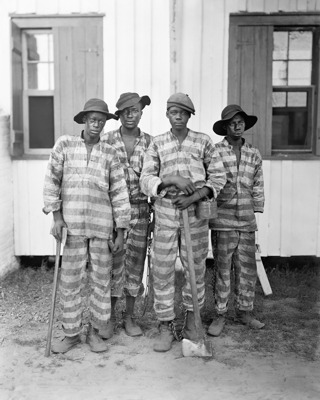 The 45th President of the United States is looking at some serious jail time.
The 45th President of the United States is looking at some serious jail time.
According to POLITICO MAGAZINE, Trump could get as many as 640 years in the Stoney Lonesome; granted, some of that time is his own damn fault: Needling the judges and ridiculing their staffs is rarely a good tactic when dealing with people who possibly control how you are going to spend the last quarter of your life.
Trump initiated the tactic (No sane lawyer would have suggested it.) in the hope of instigating a mistrial. So far, no Judge has thrown the gavel at Trump for being a despicable boor and thus providing some credence for prejudice and a mistrial.
The sentence of 640 years is highly unlikely as it would require every Judge coming to the conclusion that Trump is an irredeemable anal aperture and deserves every year of the maximum sentence available for each charge. This is unlikely.
Secondly, Trump is 77 years old, an age most men are teaching their grandchildren how to fish. It will be difficult to convince most judges that Trump remains dangerous at that age. (On the other hand, Whitey Bolger, Boston's most enterprising criminal, was still robbing banks in his 80s: Give us old codgers some credit!)
Thirdly, Trump is a first offender, (So was John Wilkes Booth.) judges normally cut some slack for a citizen who slipped from the straight and narrow for the first time. Judges tend to be lenient in such cases.
Fourth, Judges really don't like to throw the full book at politicians because it smacks of banana republic vengeance.
Still, the Georgia RICO charge requires a MINIMUM sentence of five years upon conviction. There can be no "extenuating circumstances" that would lead to a lesser sentence or just fines, probation and community service.
Most importantly, the Georgia RICO charge is a state charge. This renders the fear that Trump could pardon himself moot. If convicted Trump would have to do the full five years, minus time off for good behavior.
Does this mean that the 45th President of the United States will end up on a Georgia chain gang?
No, the Georgia chain gang was abolished in 1943, due in part to the effect of a classic Hollywood motion picture "I AM A FUGITIVE FROM A GEORGIA CHAIN GANG".
HOWEVER, there are Georgians who would like to see the chain gang revived as a tourist attraction. Indeed, there are liberals who would not mind seeing Donald Trump chained to a Black gentleman in an integrated chain gang, "making little ones out of big ones."
(Believe it or not, the chain gang HAS been revived by Humanity's Friend, Sheriff Joe Arapaio of Maricopa County, Arizona. Yes, they wear the classic black and white stripped uniform and there is even a lady's chain gang!)
"ORDAINED BY GOD"
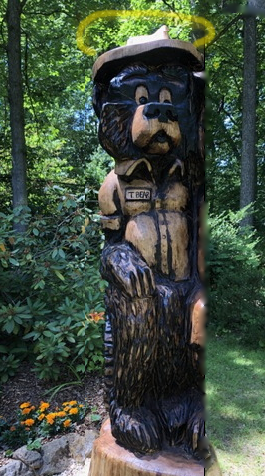 "It's not a bad likeness" The Great Bear said judiciously "Though I would have made the statue a bit larger."
"It's not a bad likeness" The Great Bear said judiciously "Though I would have made the statue a bit larger."
"Red oaks don't get that big." I said "If you want big, we need to go to California and get a Giant Sequoia."
"I don't think the NPS would approve" Thunderbear said, disapprovingly.
"I was only joking" I said.
"Still, it's a thought" The Great Bear said thoughtfully.
Thunderbear and I were inspecting the statue of himself carved from a Northern Red Oak by the chain saw sculptor, Colin Vale.
The Bear raised himself to his full height of ten feet and stood beside the statue. He extended his wings to their 28 foot span and laughed.
"Yes, it's a good commemoration of myself! It shows my inner strength; I like it!"
"I thought you would." Thunderbear would never need an ego transplant and the statue only reinforced the Great Bear's opinion of himself.
"How did I get so honored?" The Bear asked enthusiastically.
"Right place at the right time" I said, cryptically.
"Our hundred foot tall Red Oak developed a fatal disease and our arborist recommended that we take it down before it takes us out during a windstorm. I was familiar with the work of a chainsaw sculptor, Colin Vale, and asked him if he could do a flying bear. He said he would like to try and suggested that we leave an 8 foot stump for him to work on.
Anyways, he did a good job. Colin said he liked doing mythological creatures. I thought it best not to tell him you were not mythological."
"A wise move" said the Bear "It may be necessary for me to go public in the future, but that future is not now. However, if you do not get this global warming under control, I may have to make an appearance at the United Nations."
"You should probably talk with Mike Johnson first" I suggested.
"Who is Mike Johnson?" The Bear asked, suspiciously.
"He is Speaker of the House of Representatives, and I might add, God's Representative on Earth.
"I AM GOD'S REPRESENTATIVE ON EARTH!" snarled Thunderbear.
"It seems you now have some competition" I suggested, mildly.
"WHO SAYS! "? roared the Great Bear.
"THE NEW YORK TIMES for one, I said confidently. "The NYT is our newspaper of record; If it isn't in the TIMES, it simply isn't."
"The NYT claims that Mr. Johnson said that he believes that his ascension to the speakership to "be divinely ordained. This means that God trusts Mike Johnson more than he trusts you."
"I DON'T BELIEVE THIS! I FRIGGIN' DON'T BELIEVE THIS! "the Great Bear thundered. "That Mike Johnson is an imposter! I'm in charge of this planet! I'll contact Celestial Central!
"Perhaps the new Speaker of House was only speaking rhetorically" I said soothingly. Perhaps Johnson meant that God has no particular objection to his being Speaker of the House; sort of like the sun coming up in the East and going down in the West; He really has no interest in taking over your job."
This seemed to calm Thunderbear.
"People tend to put words in God's mouth" I said piously "Do you remember the case of THE DESERET NEWS?"
Thunderbear pondered a moment; "Yes, a Utah newspaper. I believe it has a rather strange slogan."
"Indeed it does" I said helpfully "The slogan or masthead of the DESERET NEWS is "We believe the Constitution of the United States to be divinely inspired."
"A noble thought, but not necessarily a reflection of the opinion of the Deity." Thunderbear said sternly.
"How so?"
You recall the 18th Amendment to The Constitution?"
Something about "No drinking Alcohol in the U.S"
Correct. Now what did the 21stAmendment say?
The 18th Amendment was repealed.
"Correct: Now what does this imply?"
"That God fell off the wagon?"
The Great Bear frowned.
"Or that God doesn't read the DESERET NEWS"
SAFETY MESSAGE
 (Ah, this and only this, is what you were using the government computer to search for: the monthly safety message!)
(Ah, this and only this, is what you were using the government computer to search for: the monthly safety message!)
Now neighbors, much of safety management is common sense: If something tends to burn you, crush you, or blow you up, then don't do it.
This simple safety rule is often overruled in the name of "can't be bothered" or "having other things to do". This means taking shortcuts, usually disastrous.
One common, homely disaster is cooking water for instant coffee or soup. You put the kettle on the fire and then go off to do something else, the "going off" is the part that can get you into trouble.
Something always comes up that masked your good intentions, until, with horror, you return to the kettle or pot, which is now glowing cherry red and has welded itself to the burner. That is the scenario if you are lucky. It can be much worse.
You can stop this scenario by simply not doing it.
It seems that there have been vast improvements in water cooking since the first paleolithic lady found out how to boil water.
In the last ten years, I have gone through about five tea kettles of various cost and design. My wife voted for a change. No more tea kettles. I could either drop heated stones into a pottery bowl full of water, or I could find something else.
The "something else" turned out to be an electric water boiler. It is purposely designed for the absent minded. It shuts itself off when the water begins to boil, so it cannot boil dry. It cannot be turned on if there is no water in it. It has a window in it so you can see (as well as hear) the water boiling. It holds between one and seven cups, enough to satisfy most boiling water enthusiasts. Best of all, it is almost instantaneous, with boiling water at the flick of a thumb, eliminating the reason for wandering away from the slow boiling tea kettle (and disaster) in the first place. It has the added advantage of being more energy efficient in churning out the old BTU's and thus marginally improving the environment.
There are a number of these gadgets on the market, the best one seem to run around $40 at your friendly discount store. The one by Braun is particularly good.
If a lot of safety is common sense, then this gadget is a pretty good sixth sense.